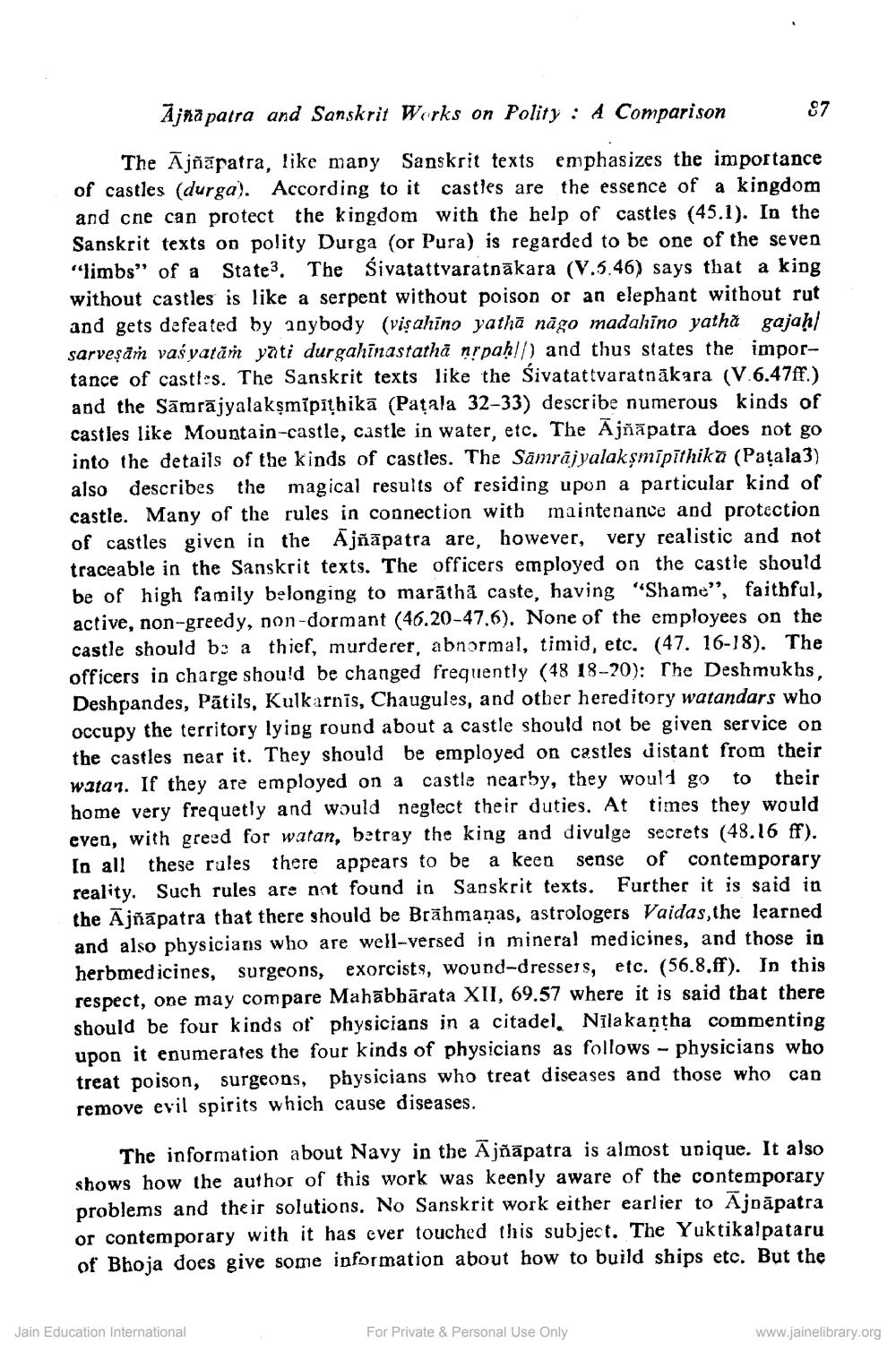________________
Ājna patra and Sanskrit Works on Polity : A Comparison
87
The Ajñāsatra, like many Sanskrit texts emphasizes the importance of castles (durga). According to it castles are the essence of a kingdom and che can protect the kingdom with the help of castles (45.1). In the Sanskrit texts on polity Durga (or Pura) is regarded to be one of the seven "limbs” of a State3. The Sivatattvaratnākara (V.5.46) says that a king without castles is like a serpent without poison or an elephant without rut and gets defeated by anybody (vişahino yathā nāgo madahino yatha gajah/ sarveșāṁ vaśyatām yâti durgahīnastathā nrpaḥ|/) and thus states the importance of castles. The Sanskrit texts like the Sivatattvaratnākara (V.6.47ff.) and the Sāmrājyalaksmīpithikā (Patala 32-33) describe numerous kinds of castles like Mountain-castle, castle in water, etc. The Ajñāpatra does not go into the details of the kinds of castles. The Samrajyalaksmīpithika (Patala 3) also describes the magical results of residing upon a particular kind of castle. Many of the rules in connection with maintenance and protection of castles given in the Ajñāpatra are, however, very realistic and not traceable in the Sanskrit texts. The officers employed on the castle should be of high family belonging to marātha caste, having "Shame", faithful, active, non-greedy, non-dormant (46.20-47.6). None of the employees on the castle should be a thief, murderer, abnormal, timid, etc. (47. 16-18). The officers in charge should be changed frequently (48 18-20): The Deshmukhs. Deshpandes, Pātils, Kulkarnis, Chaugules, and other hereditory watandars who occupy the territory lying round about a castle should not be given service on the castles near it. They should be employed on castles distant from their watan. If they are employed on a castle nearby, they would go to their home very frequetly and would neglect their duties. At times they would even, with greed for watan, betray the king and divulge secrets (48.16 ff). In all these rules there appears to be a keen sense of contemporary reality. Such rules are not found in Sanskrit texts. Further it is said in the Ājñāpatra that there should be Brāhmaṇas, astrologers Vaidas, the learned and also physicians who are well-versed in mineral medicines, and those in herbmedicines, surgeons, exorcists, wound-dressers, etc. (56.8.ff). In this respect, one may compare Mahābhārata XII, 69.57 where it is said that there should be four kinds of physicians in a citadel. Nīlakantha commenting upon it enumerates the four kinds of physicians as follows - physicians who treat poison, surgeons, physicians who treat diseases and those who can remove evil spirits which cause diseases.
The information about Navy in the Ajñāpatra is almost unique. It also shows how the author of this work was keenly aware of the contemporary problems and their solutions, No Sanskrit work either earlier to Ajpāpatra or contemporary with it has ever touched this subject. The Yuktikalpataru of Bhoja does give some information about how to build ships etc. But the
Jain Education International
For Private & Personal Use Only
www.jainelibrary.org




